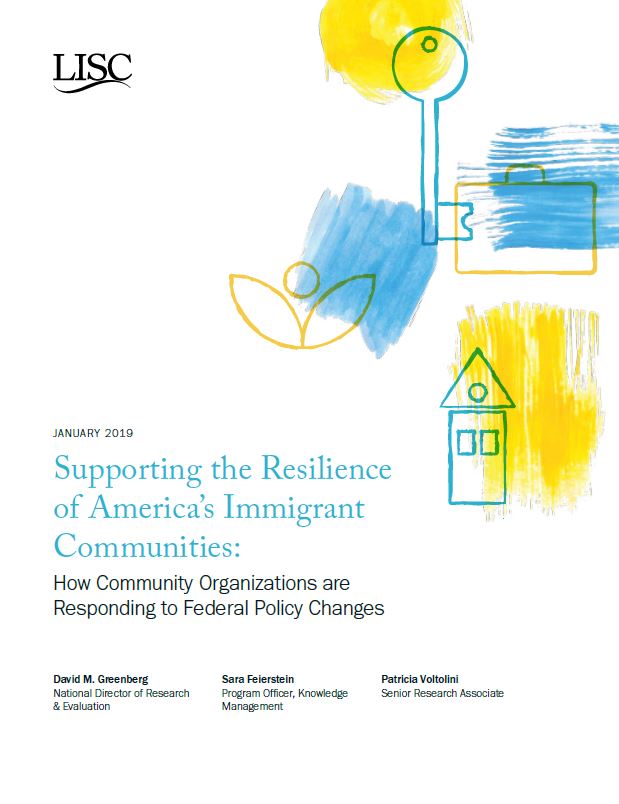Supporting the Resilience of America’s Immigrant Communities
A new LISC white paper examines the ways current federal immigration policy is affecting immigrant residents across the country, and how our nonprofit partners are responding to these challenges and stepping up to meet the needs of immigrants and their families.
Executive Summary
For as long as immigrants have come to the United States, immigrant-serving and immigrant-led organizations have provided them direct support, advocated for their rights and needs, and connected them to public benefits for which they are eligible. These roles are especially important during moments of strain or challenge, such as those that occur as a result of changes to federal policies affecting immigrants and their families. Because nearly one in four households with children contain an immigrant parent, researchers have documented how recent and proposed changes related to Deferred Action for Childhood Arrivals (DACA), to refugee and asylum-seekers, persons with Temporary Protected Status (TPS), and detention and deportation practices impact millions of children and adults.
This research brief seeks to understand the impact of these policy changes not just on immigrants, their families, and the communities in which they live but upon the local institutions that support them. Based on interviews with practitioners in Chicago, Houston, Kansas City, Los Angeles, and New York who serve varied ethnic neighborhoods, the brief explores how organizations have responded so as to support the resilience of immigrant communities. The paper particularly focuses on policy implications related to proposed changes to “public charge” determinations. Public charge is a concept in immigration law which allows officials to examine whether an individual will become primarily dependent on governmental assistance. The interviews conducted for this research project found that recent changes in federal immigration policy have:
- Negatively impacted immigrant communities. Interviewees across the five cities studied described fear and confusion in immigrant communities, children forced to play adult roles, and declines in enrollment to public benefits to which groups are entitled. This had the reported effect of compounding any food and housing insecurity that communities were already experiencing.
- Impacted the work of community organizations. One critical role of immigrantserving organizations is to connect families to the public benefits to which they are entitled, and to public institutions such as the judicial system. This work has become more challenging. While the described impact varied across interviews, practitioners described how many people were newly hesitant to obtain health or emergency food benefits, and to pursue their legal rights, because there was a fear that this might affect future attempts to become permanent residents or citizens, and/or result in deportation. Despite the reported drop-off in engagement with public benefits, however, organizations interviewed had steady or increased demand for their own services — and experienced increase costs — due to increased community needs.
- Increased the role of community organizations. Across the five cities studied, community organizations have conducted more extensive outreach to serve families who might be reluctant to come forth for help of all sorts. They have adapted existing services to share information about changing immigration policies, provided new direct support to community members as they interacted with immigration agencies, and engaged in new service or advocacy coalitions to respond to emerging community needs.
- Factors that helped organizations respond to new community needs effectively. No interviewee said that it was a difficult decision to respond to emerging needs in the communities they serve. At the same time, many recounted significant costs to adapting services or providing new ones. Strong relationships with residents, having resources to devote to the work, and access to strong service and advocacy networks both helped organizations start to engage with new needs in their communities and become effective in it.
Policy implications from these findings include:
- Implications of the proposed public charge rule change. Consistent with past research, LISC’s research finds that the proposed public charge rule change would harm the public health, safety, and economic mobility of immigrant communities. LISC’s research also suggests that community organizations may experience significant cost multipliers due to the proposed “public charge” rule change, as groups spend significant effort reaching newly-fearful populations for all kinds of services.
- New resource needs. Given the escalation of need in immigrant communities, groups and networks need additional resources so they can develop the necessary expertise to assist individuals and engage in advocacy for their communities, to provide accurate information to combat fear and misinformation. At the same time, community organizations cannot be expected to make up for the loss of Medicaid, SNAP, or federal housing assistance that will come from the direct and “chilling” effects on benefit access related to public charge.

LISC CEO, Maurice A. Jones, and David Greenberg, our head of research and lead author of the report, weigh in on why supporting the wellbeing and prosperity of immigrant communities is in every American’s best interest.
